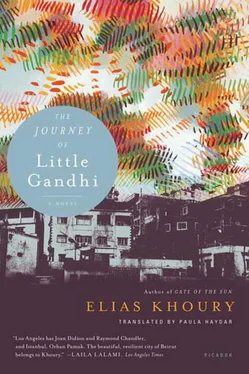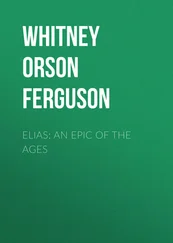After that experience at the amusement park, he changed and became less talkative. Alice fell more in love. That’s when she realized that love is jealousy.
“Love doesn’t exist if you don’t get jealous, if you don’t feel that the other person is not really yours.”
This is what she used to say when she’d try to make excuses for the way Husn behaved around Madame Nuha.
“You see, my dear Gandhi, Husn is in love, in other words totally lost. He can’t stand to be without the woman for one minute, and that explains everything.”
“God help him,” Gandhi said and went to work. Gandhi didn’t have any more work to do. Being in charge of keeping the streets clean became pointless. With the deterioration of things as a result of the situation in Beirut in 1980 and 1981, explosives were all over the place. People became afraid of garbage collection areas because these had become the perfect place to plant bombs. So Gandhi was content with merely picking up the black trash bags from people’s houses and throwing them in the dump near Khayyam Cinema. As for driving the garbage truck around, he gave that up altogether, and with time he also stopped picking up people’s trash and taking it to the dump. The first of every month he’d make his rounds and take his pay, as if he’d become a beggar. And that’s how he felt; or as if he were blackmailing people. But it had become impossible for him to go back to his old line of work, and he didn’t decide to go back to it until the morning of September 15, 1982, when the Israelis entered Beirut and the city was filled with their black boots, their beards, and their stench. This was the day Gandhi would die, on top of his shoe-shine box, and the story would end. And when all trace of Alice would be lost, in 1984, after the war broke out anew in the city, we would lose track of all the characters in this novel. Even traces of the Reverend Amin, tucked away in the nursing home in Ashrafiyyeh, would be lost.
When Alice lost touch with Lieutenant Tannous, she became very depressed and would cry all the time. She’d be in the bar sitting with the customers until four in the morning, drinking with them. She’d let them get close to her and kiss her and she’d listen to their stories, and there she’d cry every night, with every story she heard. It got to the point where the owner wanted to fire her, but the impresario Abu Jamil saved her by sending her to Mosul. There Alice discovered a different kind of love and began to forget.
“The best part about love is forgetting it. Being able to forget is what makes us human.” That’s what she’d say while she told the story of “The Leader.”
Alice was tired of her work, of Beirut, of Tannous, and of her tears. The revolution of 1958 brought about a frightening increase in business, especially after the arrival of the marines, who would stay up all night carousing. Then the marines disappeared after the whorehouse incident when Abu Mansour kidnapped one of them while he was with the prostitute Samia the Copt, and didn’t release him until the president of the republic himself stepped in and after he got an unknown sum of money.
And she left.
This time she didn’t work in the nightclub as she had agreed with Abu Jamil. She went directly to Baghdad Hotel, and she was not allowed to leave the hotel or talk to anyone. At night the same man would come and take her to the black room, and the story that took place two years earlier repeated itself. But this time Alice had to sleep on the side of the bed next to the table, because that’s what he’d made her do the first night. She felt as though his left hand were tied to his neck, but she didn’t say anything. She went where he told her to go. He kissed her shoulder and lay down on his back, motionless. She spent the whole night waiting for him to move. Even his breathing was slight. And his old smell, the smell of dusty clothes and salt, faded away. Alice started going to that black room to sleep, and after two weeks she decided to go back. She couldn’t take the boredom, they killed her, boredom and this dark corpse that would get dressed and sleep next to her. But she didn’t dare talk about it. A whole month went by. Alice didn’t know where she got the courage. The man was lying on his back as if he were dead and she sat up and said she was going to leave the next day. No response. She said she was bored with spending the whole day in the hotel with nothing to do except crossword puzzles. No response. She said she missed dancing and asked him if he wanted her to dance for him. No response.
Alice got scared. She was afraid the man was dead. From the beginning she hadn’t violated the rituals of that black room. She’d stay firm in her place on the bed and he was the one who’d come close and move away. But he stopped coming close. He’d enter the room, she’d notice a shadow entering, he’d throw himself down next to her and go to sleep. He even stopped kissing her. Alice wanted to know if his eyes were open or shut. She spent three days sleepless over this question. She went up close to him, but this time he didn’t move or push her away with his right hand as he usually did. She went up close to him and kissed him. He was cold and tasted like a dead fish. Alice put her hand on his waist and he pulled back a little. Alice didn’t know what came over her. A kind of anger inflamed her entire body when she saw him pull back, and she shouted.
“What do you want from me! Who the hell are you?”
She heard snoring, or something that resembled snoring, and she got the feeling the man was trying to stand up. She grabbed onto him, by his shirt, and his shirt almost tore in her hands. She went closer and laid on top of him and began kissing him. It was as though something were raging inside her. The man stayed still like a dead fish. Alice doesn’t remember what happened exactly. She went down. She left his side and moved down to the bottom of the bed. She grabbed him by the balls and started to pull. When she grabbed him she didn’t intend anything, but he didn’t move, he just stayed there, totally still, his breathing increasing only slightly. Alice pulled harder and screamed, and amidst her hysterical screaming she heard him screaming, too, as if he were yelping like a dog. He pushed her and stood up.
“You, you!” she shouted.
“Hush, hush,” the man sighed as he stood there.
“You are ‘The Leader.’ I know you, you son of a bitch.”
He ran around the room and then he disappeared.
Alice ran away. She said no one objected to her leaving. The next day she went to the airport and returned to Beirut.
Lieutenant Tannous didn’t run away. It seemed his wife found out. On one of those mornings while Tannous was shaving before leaving for his house, with Alice standing by his side in the bathroom, watching the shaving cream on his face and the razor sliding and turning his face into a mirror, the doorbell rang. Alice put her robe on over the nightgown she was wearing and opened the door. She was shocked. She couldn’t open her mouth.
“Are you Alice?” the woman asked.
“Yes. Come on in.”
Alice’s body trembled slightly.
“Where’s Tannous?”
“Please come in, Ma’am.”
The woman came in. Tannous’s wife had blond hair, long eyelashes, a full figure, and skin as white as snow.
“Tell him I want to see him.”
“Make yourself at home.”
The woman sat on the edge of the sofa and Alice sat in front of her, not knowing what to do.
“Would you like a cup of coffee?”
“I told you I want him. Where is he?”
Alice left her there in the middle of the room and rushed to the bathroom to find Tannous naked in front of the mirror, totally confused. All of a sudden Alice noticed his paunch, which was getting bigger, and the hair on his back, which was like an ape’s. She told him; she tried to tell him. He motioned to her as if he wanted to stop her voice from coming out. He got dressed in a hurry and went to the living room. Alice hesitated before following behind him, and then she saw him as he really was.
Читать дальше












